In 1926, a 31-year-old businessman returned to Korea from the U.S. and realized that his country faced great hardships under Japanese colonization.
In the belief that, “Healthy people can receive a better education and get their country back on its feet,” he chose to work in the pharmaceutical industry to protect the health of the nation. So he launched his company, Yuhan, in Jongno, Seoul. This is story of Dr. New Ilhan (1895-1971), the founder of Yuhan Corporation.
At that time, people were only able to get imported drugs from overseas, but these drugs were extremely expensive for the common person. New developed medicines for tuberculosis and, in 1933, he developed an anti-inflammatory analgesic with help from his wife, Ho Miri, who was a doctor. This was the birth of Antiphlamine, Korea's best-known anti-inflammatory analgesic.
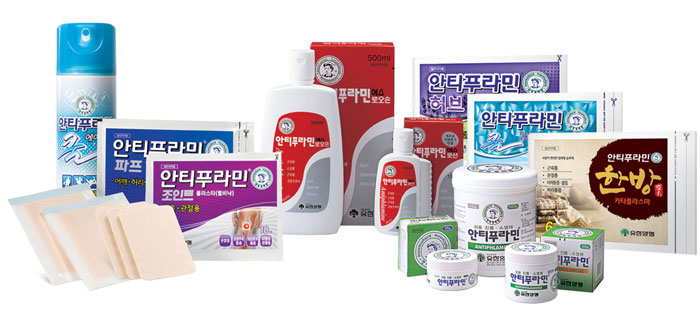
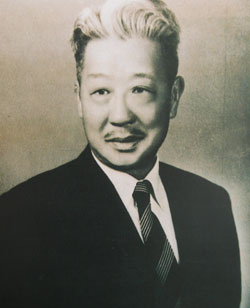
With the goal of making the best products to help the country and its people, New, the developer of Antiphlamine, emphasized the firm’s role in contributing to the nation, not just in pursuing a profit. In fact, Yuhan is the best-known company for being a good corporate citizen and for contributing to good causes across Korea.
New devoted his life to the liberation of Korea during Japanese colonization and to the improvement of the health of the people after liberation. When he retired from his managerial post, in order to set up a transparent system of corporate governance he donated his 56,000 stock shares in his company to found the Yuhan Foundation and handed over managerial duties to a specialist, not to a family member or to a relative. He said at the time that, “All profit earned from running the business should be returned to society, which grew the company.” In this belief, he donated all of his wealth to society in 1971 when he passed away. In 1995, New was posthumously conferred with the Order of Great Contribution to the National Foundation by the President of Korea.
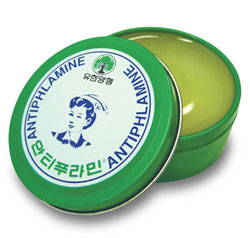
Antiphlamine is a very popular product for many people as it is the No. 1 item in their first-aid kits. The medicine was initially developed to treat joint inflammation, neuralgia, muscular pain or other such wounds. However, people use it to treat all kinds of wounds and symptoms, such as sprains, joint pain, itches, bruises, blisters on the hands or feet, insect bites and even apply it to the upper lip to clear blocked noses.
Such a wide use of the medicine is due to its ingredients, including menthol, camphor and methyl salicylate, all of which show effectiveness in anti-inflammation analgesic functions, vasodilatation and in reducing itchiness. Antiphlamine also has a high moisturizing effect, as it contains a high level of Vaseline.
Since its launch in 1933, Antiphlamine has been the top anti-inflammatory analgesic. It did face some hardships along the way, however. Yuhan introduced an Antiphlamine lotion in 1999 to diversify its product line, but its popularity declined as the popularity of patch-type anti-inflammatory analgesics rose. Antiphlamine sales stood at KRW 2 to 3 billion at the time. The company concentrated on improving the quality of its products. As a result, in 2010 the firm introduced the Antiphlamine Joint Plaster Pain Relief patch, the Felbinac Knee Joint Arthritis patch, the Antiphlamine patch, the Antiphlamine Large Cool Pain Relief patch and the Antiphlamine Cool Air Pain Relieving spray.
Integrated sales of all Antiphlamine varieties have more than doubled to KRW 5.9 billion in 2011, from KRW 2.4 billion in 2010. Sales of Antiphlamine products hit KRW 9.89 billion in 2013.
Today, Antiphlamine is exported to overseas, including Vietnam and Myanmar. Yuhan produces a wide range of medical products, including general pharmaceuticals, sanitary aids, health-functional foods, daily supplements, animal drugs, medical appliances and diagnostic reagents.
In 2006, Yuhan built a plant in Ochang-eup (Town) in Cheongwon-gun (County), Chungcheongbuk-do (North Chungcheong Province). Covering a total floor space of 50,856 square meters, this plant -- a four-story building with a basement -- is so far the largest pharmaceuticals plant in Korea. It produces ordinary medical products, animal drugs, penicillin and antibiotics. It is equipped with cutting-edge production facilities, including automated production lines, measuring facilities and a logistics center, all of which meet the U.S.' Current Good Manufacturing Practices standards.
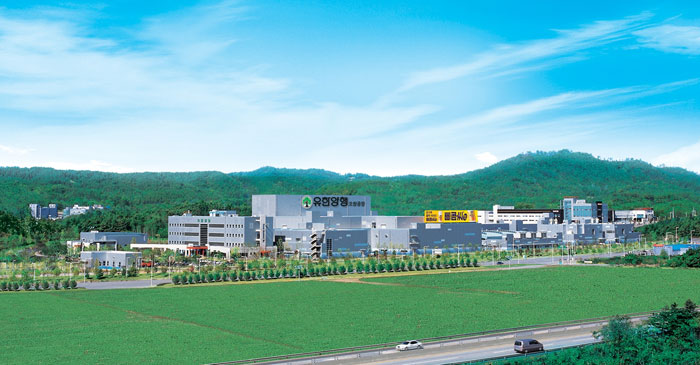
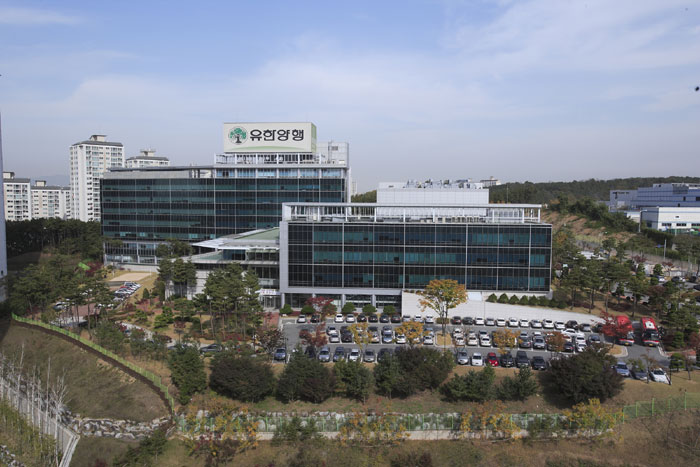
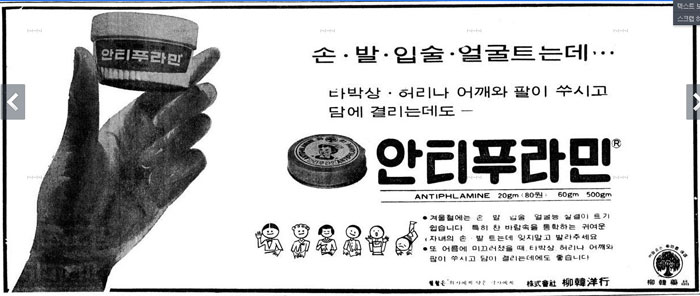
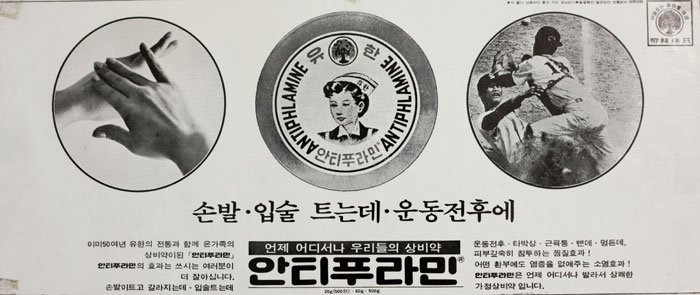
By Yoon Sojung
Korea.net Staff Writer
arete@korea.kr aince
In the belief that, “Healthy people can receive a better education and get their country back on its feet,” he chose to work in the pharmaceutical industry to protect the health of the nation. So he launched his company, Yuhan, in Jongno, Seoul. This is story of Dr. New Ilhan (1895-1971), the founder of Yuhan Corporation.
At that time, people were only able to get imported drugs from overseas, but these drugs were extremely expensive for the common person. New developed medicines for tuberculosis and, in 1933, he developed an anti-inflammatory analgesic with help from his wife, Ho Miri, who was a doctor. This was the birth of Antiphlamine, Korea's best-known anti-inflammatory analgesic.

Today, a wide variety of Antiphlamine products can be purchased, ranging from ointments to lotions, sprays and patches.

The founder of Yuhan Corporation, Dr. New Ilhan (1895-1971).
With the goal of making the best products to help the country and its people, New, the developer of Antiphlamine, emphasized the firm’s role in contributing to the nation, not just in pursuing a profit. In fact, Yuhan is the best-known company for being a good corporate citizen and for contributing to good causes across Korea.
New devoted his life to the liberation of Korea during Japanese colonization and to the improvement of the health of the people after liberation. When he retired from his managerial post, in order to set up a transparent system of corporate governance he donated his 56,000 stock shares in his company to found the Yuhan Foundation and handed over managerial duties to a specialist, not to a family member or to a relative. He said at the time that, “All profit earned from running the business should be returned to society, which grew the company.” In this belief, he donated all of his wealth to society in 1971 when he passed away. In 1995, New was posthumously conferred with the Order of Great Contribution to the National Foundation by the President of Korea.

The old packaging for Antiphlamine ointment is in a green tin with a picture of a nurse. This product has been discontinued.
Antiphlamine is a very popular product for many people as it is the No. 1 item in their first-aid kits. The medicine was initially developed to treat joint inflammation, neuralgia, muscular pain or other such wounds. However, people use it to treat all kinds of wounds and symptoms, such as sprains, joint pain, itches, bruises, blisters on the hands or feet, insect bites and even apply it to the upper lip to clear blocked noses.
Such a wide use of the medicine is due to its ingredients, including menthol, camphor and methyl salicylate, all of which show effectiveness in anti-inflammation analgesic functions, vasodilatation and in reducing itchiness. Antiphlamine also has a high moisturizing effect, as it contains a high level of Vaseline.
Since its launch in 1933, Antiphlamine has been the top anti-inflammatory analgesic. It did face some hardships along the way, however. Yuhan introduced an Antiphlamine lotion in 1999 to diversify its product line, but its popularity declined as the popularity of patch-type anti-inflammatory analgesics rose. Antiphlamine sales stood at KRW 2 to 3 billion at the time. The company concentrated on improving the quality of its products. As a result, in 2010 the firm introduced the Antiphlamine Joint Plaster Pain Relief patch, the Felbinac Knee Joint Arthritis patch, the Antiphlamine patch, the Antiphlamine Large Cool Pain Relief patch and the Antiphlamine Cool Air Pain Relieving spray.
Integrated sales of all Antiphlamine varieties have more than doubled to KRW 5.9 billion in 2011, from KRW 2.4 billion in 2010. Sales of Antiphlamine products hit KRW 9.89 billion in 2013.
Today, Antiphlamine is exported to overseas, including Vietnam and Myanmar. Yuhan produces a wide range of medical products, including general pharmaceuticals, sanitary aids, health-functional foods, daily supplements, animal drugs, medical appliances and diagnostic reagents.
In 2006, Yuhan built a plant in Ochang-eup (Town) in Cheongwon-gun (County), Chungcheongbuk-do (North Chungcheong Province). Covering a total floor space of 50,856 square meters, this plant -- a four-story building with a basement -- is so far the largest pharmaceuticals plant in Korea. It produces ordinary medical products, animal drugs, penicillin and antibiotics. It is equipped with cutting-edge production facilities, including automated production lines, measuring facilities and a logistics center, all of which meet the U.S.' Current Good Manufacturing Practices standards.

Yuhan Corporation’s main factory in Ochang-eup in Cheongwon-gun (County), Chungcheongbuk-do (North Chungcheong Province). This is the largest pharmaceuticals production plant in Korea.

Yuhan Corporation’s research center is in Giheung-gu (District) in Yongin-si (City), Gyeonggi-do (Gyeonggi Province).


Advertisements for Antiphlamine appear in newspapers in the 1960s.
By Yoon Sojung
Korea.net Staff Writer
arete@korea.kr aince